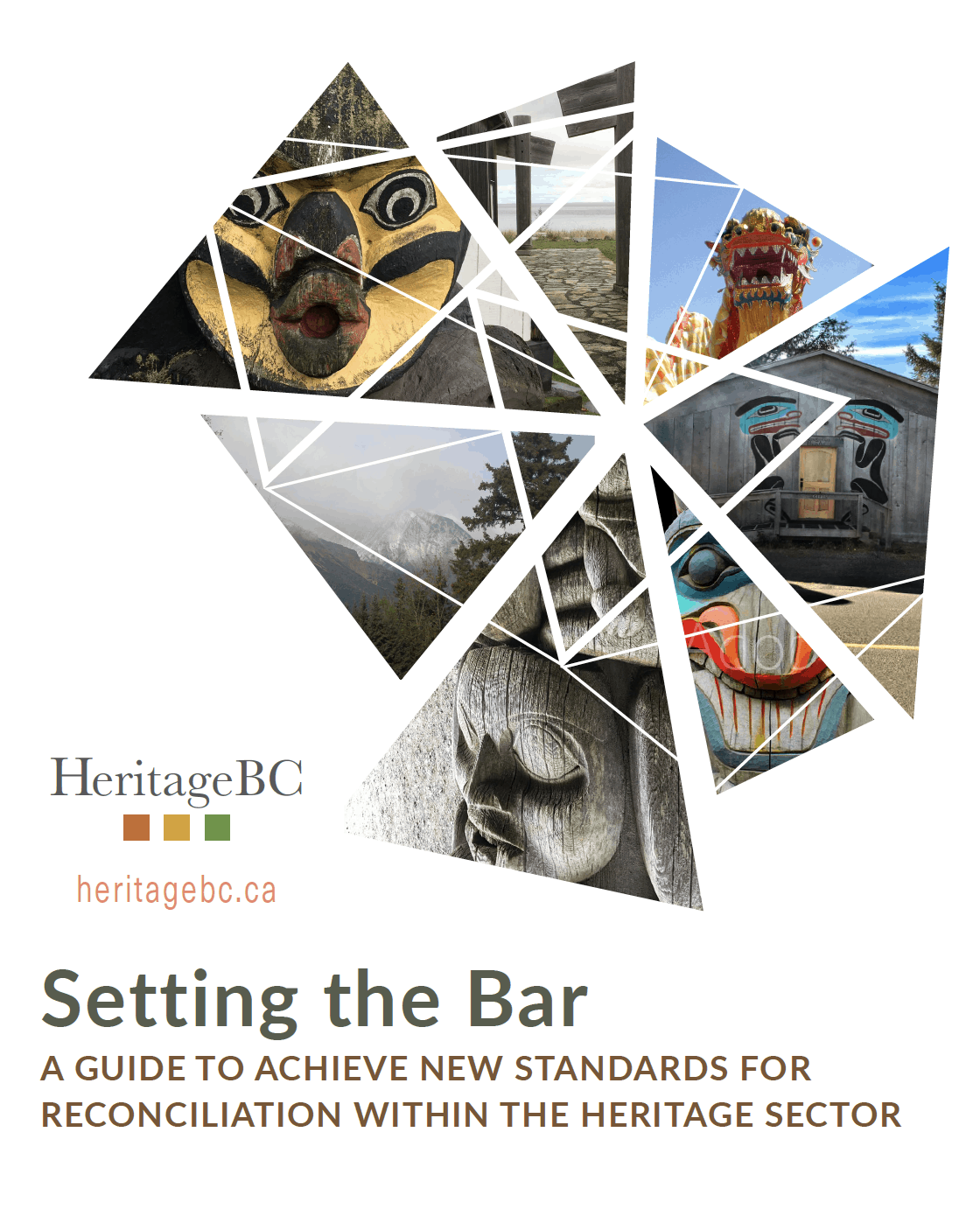- Heritage 101
- Advocacy
- Accessibility for Historic Places
- Climate & Sustainability
- Cultural Maps
- Heritage Place Conservation
- Heritage Policy & Legislation
- Homeowners
- Intangible Cultural Heritage
- Reconciliation
- Indigenous Cultural Heritage
- Setting the Bar: A Reconciliation Guide for Heritage
- 1. Heritage and Reconciliation Pledge
- 2. Acknowledging Land and People
- 3. Celebrating Days of Recognition and Commemoration
- 4. With a Commitment to Learn
- 5. Committing to Strategic Organizational Diversity
- 6. Mission-Making Room for Reconciliation
- 7. Possession, Interpretation, Repatriation and Cultural Care
- 8. Shared Decision Making
- 9. Statements of Significance and other heritage planning documents
- 10. Heritage Conservation Tools, Local Government Act
- Racism: Do Not Let the Forgetting Prevail
- Taking Action: resources for diversity and inclusion
- Webinars On-Demand
4. Setting the Bar: With a Commitment to Learn

ACTION: recognizing that learning is life-long, and reconciliation is ongoing, commit to continuing education and training related to intercultural competency, conflict resolution, human rights, and anti-racism, and diversity, equity, and inclusion.
Download 4. Setting the Bar: With a Commitment to Learn
Action #92 of the Truth & Reconciliation Commission’s calls to action states (in part):
“Provide education for management and staff on the history of Aboriginal peoples, including the history and legacy of residential schools, the United Nations Declaration on the Rights of Indigenous Peoples, Treaties and Aboriginal rights, Indigenous law, and Aboriginal–Crown relations. This will require skills-based training in intercultural competency, conflict resolution, human rights, and anti-racism.”
Our action item is a simple and easily accomplished request for your organization to commit to annual training and education. The benefits are plentiful by:
- Raising awareness of concepts related to diversity and inclusion
- Exploring your community and appreciating the diversity of cultures and experiences
- Allowing room for diverse perspectives within your organization
- Engaging directors and staff around common goals and values
- Instilling a succession of values as directors and staff change
- Advancing collaboration within the workplace
- Teambuilding and networking within the organization and community
- Developing inclusive thinking and actions
- Promoting workplace sensitivity
- Supporting hiring, placements and retention
- Diversifying training and improving job/work satisfaction and work engagement
The opportunities for education and training are almost limitless and they are often free. Of course, there are many opportunities are come with a price tag (say, $15 for a webinar and a couple of hundred for a conference), so it is helpful to plan these activities in your annual budgeting process.
Here are some suggestions of activities and resources for staff, committee and boards. Many more can be found on the internet and new resources are continually being developed. Tip: if you are planning to hire someone, plan in advance as people are very busy.
- Listen to live and listen recorded webinars
- Listen to podcasts (such as the New York Times 1619 Project and Black History for White People)
- Circulate blogs posts in board packages before a meeting; discuss the posts at the next meeting.
- Watch videos and recorded conference sessions
- Enroll in professional development, such as a conference or course, and attend meetings and share learnings with others.
- Invite a speaker to a board meeting or arrange a community meeting
- Take a course in trauma-informed practice to gain a strengths-based framework grounded in an understanding of and responsiveness to the impact of trauma.
- Learn about culture care practices, such as the spiritual side of artefacts, smudging and drumming.
Heritage BC has numerous resources available on its website:
- Taking Action webinar link
- The Reality of Inclusion when Collaborating and Partnering with Indigenous
Neighbours webinar link - Mapping Heritage: Uncovering Community webinar link
- Indigenous Cultural Heritage: a curated list of resources link
- Taking Action: resources of diversity and inclusion link
- Racism: Do not let the forgetting prevail link
There are numerous other resources available to you:
- BC Museums Association: Justice, Equity, Diversity, & Inclusion link
- BC Black History Awareness Society: learning centre link
- Black Strathcona society: videos link
- Canadian Centre for Diversity and Inclusion: podcasts link
- Bakau Consulting link
- Cultural Human Resources council: Respectful Workplaces in the Arts link
- Government of Canada: First Nations Communications Toolkit link
- Inclusion BC: includes virtual learning series link
- Indigenous Awareness Canada: Online Indigenous awareness training link
- Indigenous Relations Academy: free resource link
Indigenous Relations Academy: self-guided training link - Mosaic Engage: Intercultural, Diversity & Inclusion Training link
- Qmunity: LGBT2SAI+ Diversity Training link
- Rick Hansen Foundation: Learn about barriers you do not know about link
Please note: Heritage BC offers these resources as information only. While these sources are reputable, we do not specifically endorse the
provided opinions. We also encourage you to look within your community for more resources.
